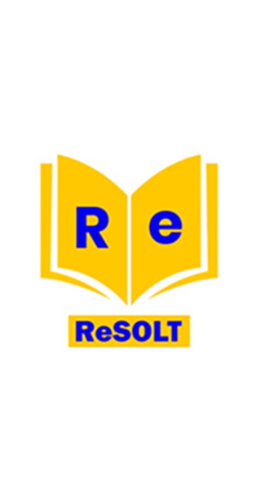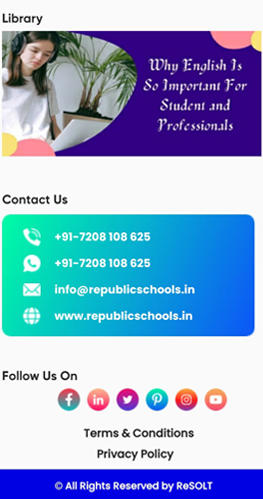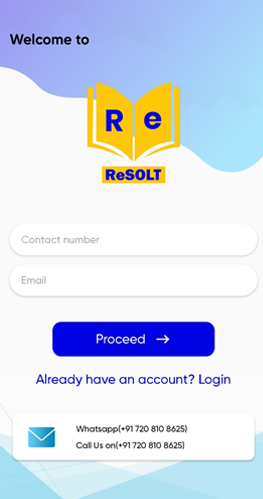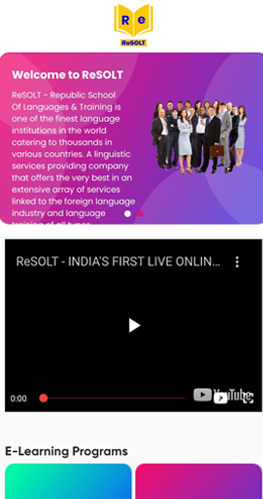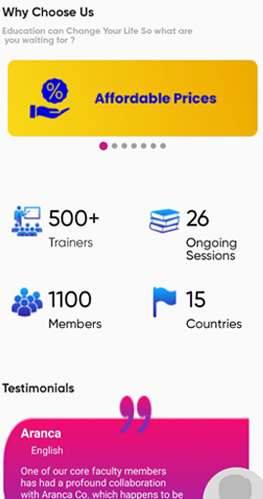Sample Video of Training Session




Courses
German Classes in Bangalore
Whatever your plans for future are, Germany will always open many doors for you. Mastering German means acquiring skills that will enable you to improve the quality of your professional and personal life. ReSOLT is a leading German institute in Bangalore providing best-in-class German language courses in Bangalore. ReSOLT is a single destination to learn German with interactive, easy-to-use, and engaging methods. We help you learn German in a way that’s tailored to your needs and goals.
We at ReSOLT provide a complete all-in-one solution for learning and mastering German. It’s designed with your needs in mind- we’ve taken care of everything from grammar tips to vocabulary through interactive exercises.
Our language learning system is built on more than 10 years of research and development. It takes you from Level A1 (an introduction) to C2 (zipping through complex grammatical structures) in no time at all. We’re here for you every step of the way. We have a team of world-class trainers who help every student, professional, business owner, and housewife with quality learning. Our trainers are always here to assist you when you need help or have questions about your progress, and we offer real-time problem-solving sessions for unlimited one-on-one help whenever necessary.
Learn German in Bangalore with ReSOLT at your own pace. We provide online German classes in Bangalore for individuals from all over the world. You can select your desired level of course, which means you can work with more advanced study materials while continuing to review what you’ve already learned.
A Brief History And Background Of German Language
The first texts ‘the Abrogans’ of the German language that we know were written in Althochdeutsch (old High-German, period between 750 and 1050). For today’s average German they are absolutely incomprehensible, they seem like texts from another language. All development of the German language began with Charlemagne. To accelerate the Christianization of the Germanic peoples, Charlemagne commissioned monks and sages to create texts in a language that could be understood in all parts of his great empire. The Germanic peoples of the time spoke of languages and dialects that had their origin in the Indo-European language from which many languages of today’s Europe originate. The clergy of the time spoke and wrote instead in Latin that the people did not understand. Today, the modern German language is well-structured, easy to understand and learn.
Why Learn German Language

1. German Is The Most Spoken Language In Europe
German is the official language in many countries of the European Union- Germany, Austria, regions in Switzerland, Belgium, Italy, Liechtenstein, and Luxembourg. With over 100 million native speakers, German has become the second most widely spoken language in European Union. Speaking German will therefore allow you to communicate and interact with 185 million people around the world.
2. German Is A Language Of Science, Technology And Information
Germany has acquired an important place in the fields of science, research, and development. Thus, a large number of important websites are in German. Germany is third in the world in terms of research and development and offers scholarships to foreign scientists. Learning German will help you boost your career in the fields of science, research, and development.
3. Germany Is The Leading Economic Power In The EU
Germany is the largest economy in Europe and the third-largest in the world. The German economy is focused on industrial goods and services. Its machine tools, vehicles, and chemicals, in particular, are highly regarded internationally. More than one in four euros is made from exports, more than one in five jobs depends directly or indirectly on foreign trade. Germany’s share in world trade is 9%. With your German language skills, chances are high for you to secure a place in these leading industries.
4. It's Not That Hard
Various people think that German is very difficult to learn and has complicated grammar. If you are thinking the same then you are wrong. German is not that hard as you think. It is a beautiful language that is widely used in various European countries. If you know English then you can easily make progress withGerman language. Yes, it sounds crazy, but it’s true. In terms of vocabulary, grammar, syntax, expressions, intonations, etc., these two languages have many similarities, making it one of the easiest languages to learn.
5. Learn German For Work
Against the setting of a somewhat bleak European monetary scene, Germany is performing admirably close by its neighbors. Numerous professionals and business owners decide to come and settle in this beautiful and well-developed country, with the expectation of improving their career prospects. Germany’s economic strength is one of the reasons why more and more people are learning the German language. But, be careful with bogus hopes: without speaking even a single word of Goethe’s language, it is hard to find a job you love. Learning German will extraordinarily further develop your odds of integrating into the labor market.
6. Study In Germany
Did you know Germany is the most affordable country in terms of Education? Unlike other countries, Germany is a financially accessible country for local and international students. With minimal registration fees of around 600 euros per semester, all students from different parts of the world can study in Germany. This is about 20 times less than the average registration fee in England, Australia, or Canada, and almost 40 times less than in the United States.
Levels of German taught at ReSOLT
1. Elementary use of language ( A1 )
Can understand and use familiar, everyday expressions and very simple sentences, which relate to the satisfying of concrete needs. Can introduce him/herself and others as well as ask others about themselves – e.g. where they live, who they know and what they own – and can respond to questions of this nature. Can communicate in a simple manner if the person they are speaking to speaks slowly and clearly and is willing to help.
2. Elementary use of language ( A2 )
Can understand sentences and commonly used expressions associated with topics directly related to his/her direct circumstances (e.g. personal information or information about his/her family, shopping, work, immediate surroundings). Can make him/herself understood in simple, routine situations dealing with a simple and direct exchange of information on familiar and common topics. Can describe his/her background and education, immediate surroundings and other things associated with immediate needs in a simple way.
3. Independent language use ( B1 )
Can understand the main points when clear, standard language is used and the focus is on familiar topics associated with work, school, leisure time, etc. Can deal with most situations typically encountered when travelling in the language region. Can express him/herself simply and coherently regarding familiar topics and areas of personal interest. Can report on experiences and events, describe dreams, hopes and goals as well as make short statements to justify or explain his/her own views and plans.
4. Independent language use ( B2 )
Can understand the main contents of complex texts on concrete and abstract topics; also understands specialized discussions in his/her own primary area of specialization. Can communicate so spontaneously and fluently that a normal conversation with native speakers is easily possible without a great deal of effort on either side. Can express him/herself on a wide range of topics in a clear and detailed manner, explain his/her position on a current issue and indicate the benefits and drawbacks of various options.
5. Autonomous language ability ( C1 )
Can understand a wide range of challenging, longer texts and also grasp implicit meanings. Can express him/herself spontaneously and fluently without having to search for words frequently and noticeably. Can use the language effectively and flexibly in his/her social and professional life or in training and studies. Can make clear, structured and detailed statements on complex topics and apply various means of text association appropriately in the process.
6. Autonomous language ability ( C2 )
Can effortlessly understand practically everything which he/she reads or hears. Can summarize information from various written and spoken sources, logically recounting the reasons and explanations. Can express him/herself spontaneously with high fluency and precision and also make finer nuances of meaning clear in more complex topics.
Foreign Language institute that conducts the exam
Goethe-Institute
The Goethe-Institute , is a non-profit German cultural association operational worldwide with 159 institutes, promoting the study of the German language abroad and encouraging international cultural exchange and relations. Around 246,000 people take part in these German courses per year.The institute has developed a series of exams for learners of German as a foreign language (Deutsch alsFremdsprache, DaF) at all levels: A1 up to C2. These can be taken both in Germany and abroad and have been adapted to fit into the Common European Framework of Reference for Languages (CEFL), the standard for European language testing. There is also one exam, the GroßesDeutschesSprachdiplom, which is at a higher level than the highest CEFL level.[12] Below is a table of the basic Goethe-Institut exams as they fit into the scheme
Time Table
Week Days
| MONDAY | WEDNESDAY | FRIDAY |
|---|---|---|
| 08:30 am to 10:30 am | 08:30 am to 10:30 am | 08:30 am to 10:30 am |
| 10:00 am to 12:00 pm | 10:00 am to 12:00 pm | 10:00 am to 12:00 pm |
| 02:00 pm to 04:30 pm | 12:00 pm to 02:00 pm | 12:00 pm to 02:00 pm |
| 04.00 pm to 06.00 pm | 02.00 pm to 04.00 pm | 02.00 pm to 04.00 pm |
| 06.00 pm to 08.00 pm | 04.00 pm to 06.00 pm | 04.00 pm to 06.00 pm |
| 06.00 pm to 08.00 pm | 06.00 pm to 08.00 pm |
| TUESDAY | THURSDAY | SATURDAY |
|---|---|---|
| 08:30 am to 10:30 am | 08:30 am to 10:30 am | 08:30 am to 10:30 am |
| 10:00 am to 12:00 pm | 10:00 am to 12:00 pm | 10:00 am to 12:00 pm |
| 02:00 pm to 04:30 pm | 12:00 pm to 02:00 pm | 12:00 pm to 02:00 pm |
| 04.00 pm to 06.00 pm | 02.00 pm to 04.00 pm | 02.00 pm to 04.00 pm |
| 06.00 pm to 08.00 pm | 04.00 pm to 06.00 pm | 04.00 pm to 06.00 pm |
| 06.00 pm to 08.00 pm | 06.00 pm to 08.00 pm |
Week Ends
| SATURDAY / SUNDAY | ONLY SATURDAY | ONLY SUNDAY |
|---|---|---|
| 04:00 pm to 07:00 pm | 11:30 am to 02:30 pm | 08:30 am to 10:30 am |
| 06:00 pm to 08:00 pm | 02:30 pm to 05:30 pm | 11:30 am to 02:30 pm |
| 02:30 pm to 05:30 pm |
Time Table
Week Days
| MONDAY | WEDNESDAY | FRIDAY |
|---|---|---|
| 08:30 am to 10:30 am | 08:30 am to 10:30 am | 08:30 am to 10:30 am |
| 10:00 am to 12:00 pm | 10:00 am to 12:00 pm | 10:00 am to 12:00 pm |
| 02:00 pm to 04:30 pm | 12:00 pm to 02:00 pm | 12:00 pm to 02:00 pm |
| 04.00 pm to 06.00 pm | 02.00 pm to 04.00 pm | 02.00 pm to 04.00 pm |
| 06.00 pm to 08.00 pm | 04.00 pm to 06.00 pm | 04.00 pm to 06.00 pm |
| 06.00 pm to 08.00 pm | 06.00 pm to 08.00 pm |
| TUESDAY | THURSDAY | SATURDAY |
|---|---|---|
| 08:30 am to 10:30 am | 08:30 am to 10:30 am | 08:30 am to 10:30 am |
| 10:00 am to 12:00 pm | 10:00 am to 12:00 pm | 10:00 am to 12:00 pm |
| 02:00 pm to 04:30 pm | 12:00 pm to 02:00 pm | 12:00 pm to 02:00 pm |
| 04.00 pm to 06.00 pm | 02.00 pm to 04.00 pm | 02.00 pm to 04.00 pm |
| 06.00 pm to 08.00 pm | 04.00 pm to 06.00 pm | 04.00 pm to 06.00 pm |
| 06.00 pm to 08.00 pm | 06.00 pm to 08.00 pm |
Week Ends
| SATURDAY / SUNDAY | ONLY SATURDAY | ONLY SUNDAY |
|---|---|---|
| 04:00 pm to 07:00 pm | 11:30 am to 02:30 pm | 08:30 am to 10:30 am |
| 06:00 pm to 08:00 pm | 02:30 pm to 05:30 pm | 11:30 am to 02:30 pm |
| 02:30 pm to 05:30 pm |
Duration
| SATURDAY / SUNDAY | ONLY SUNDAY | WEEKDAYS |
|---|---|---|
| 2 Months | 3 Months | 2 Months |
Exam Preparation
We prepare you for Goethe Institute Certification, where you are judged on skills like Listening, Writing ,Hearing & Speaking. We have intermediate and final tests after every course based on
standard exam pattern.
Facilities

World’s Top Trainers

Affordable Fees

Flexible Timings

Live Online Learning

Offline Classes

Personal Attention

Digital Study Material

Creative Exercises

Doubt Solving & Revision

Corporate Training Programs
Follow Us On Social Media














